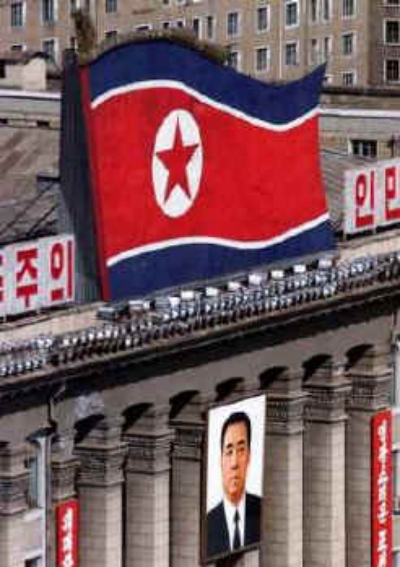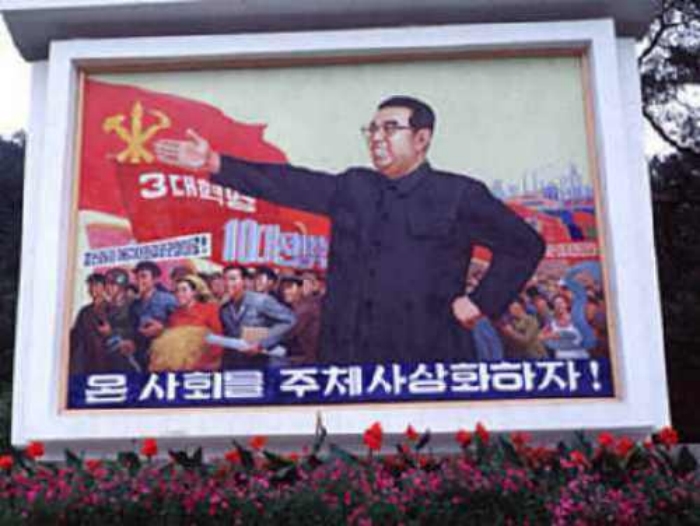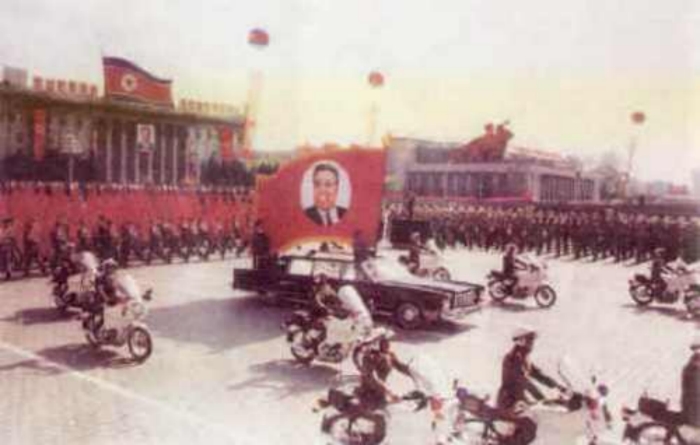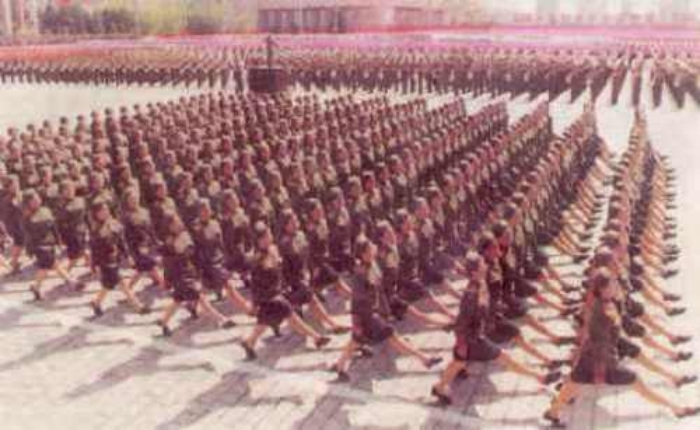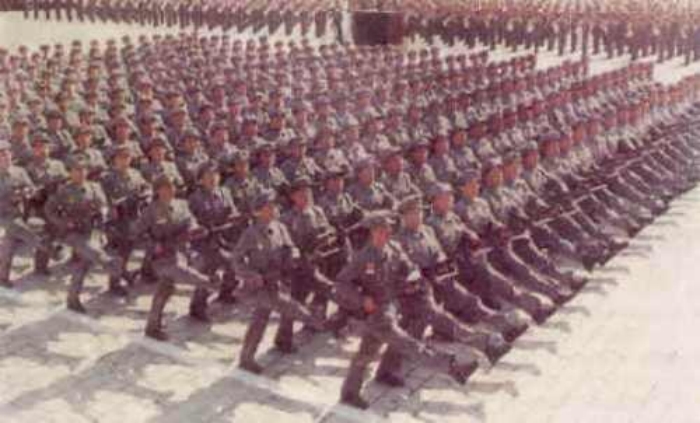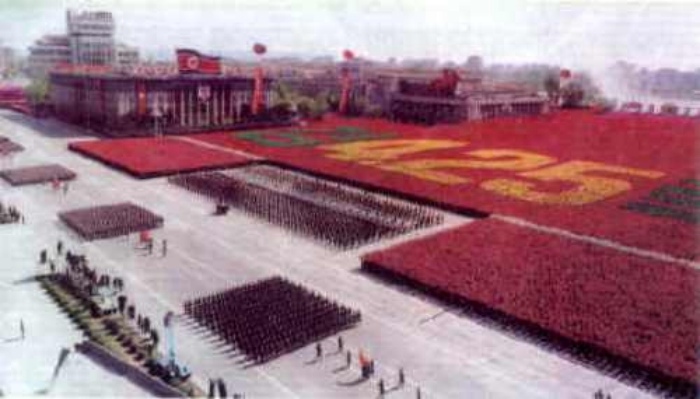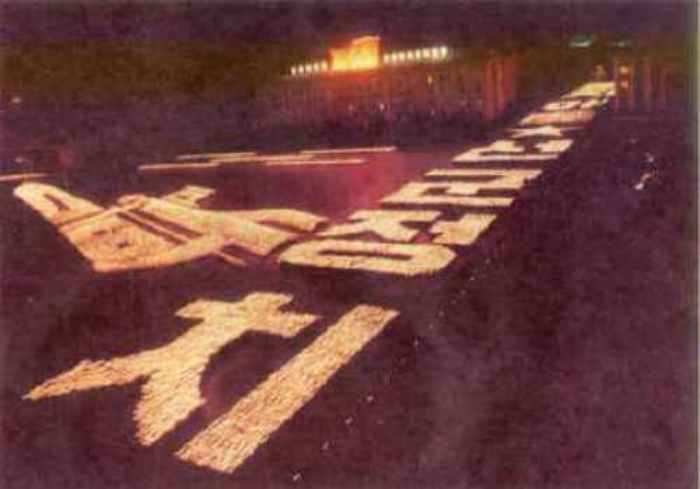
The
Pyongyang Times
Saturday, April 27, Juche 91 (2002)
Army-centred policy; sword of justice and punishment
The Russian
military historian, Academician and Professor G. I. Korotkov recently
published an article entitled "Army-centred policy; sword of
justice, sword of punishment", dedicated to the 90th birthday of
Generalissimo Kim
Il Sung and the 70th anniversary of the foundation of the Korean
People’s Army.
The main points of the article follow:
The Korean People’s Army has taken a unique path in its development. The Korean sword of punishment was born of a peculiar situation 70 years ago. It was General Kim Il Sung who lifted high the sword of justice.
The first armed force he organized and trained developed into a powerful army capable of fighting a war against a formidable enemy. Out of it came the destruction of Japanese imperialism in August 1945, with the restoration of their country to the people of Korea.
It is a well-known fact that after the end of the Second World War, the US imperialists launched endless acts of provocation and aggression against the newly-founded DPRK as part of its attempt to use Korea as a spearhead for an invasion of the Asian continent. The 1950-53 Korean war was simply the largest of those. The US imperialists tried to destroy the socialist gains the Korean had paid for with their blood.
Voices threatening socialist Korea can still be heard in Washington today. The US war moves have become more undisguised since President George W. Bush declared that north Korea, Iraq and Iran form an "axis of evil".
While pushing forward the missile defence programme, Washington has launched a propaganda campaign to make it look as if it is aimed at "protecting" the US itself from threats posed by "rogue states", including the DPRK.
At present, many ordinary Russians ask such questions as: "What is the secret behind the victorious advance of north Korea, a small country, in the face of the heavy pressure of the only superpower?" and "How could north Korea preserve its identity and sovereignty despite going through severe difficulties?"
The answers to these questions are clear: the secret is that the country is based on the army-centred politics, a political philosophy that shows the way ahead for socialism, guided by the Juche idea.
Leader Kim Jong Il usually emphasizes that state power should be enhanced by strengthening the military power of the country, including the People’s Army, and leading the development of society with the People’s Army, as its core and role model. It is his conclusion that without the People’s Army, both national defence and triumphant progress of socialist construction are impossible.
The army-centred politics the DPRK pursues is based on the Juche idea. The Juche philosophy elucidates the great truth that the popular masses must shape their future by the own efforts, as masters of their destiny.
However, even though they take charge of their destiny, success can hardly be expected in the building of their economy and in the development of their culture, to say nothing of national independence, if they do not free themselves from the threats of imperialism. The Koreans are right to say that military power means state power and national sovereignty.
An ideal model of the new method of state administration has been created in the DPRK, a socialist power, which enables its people, armed with the world-renowned Juche philosophy, to defeat any attack on the part of US imperialism.
This mode of politics is unique in its scope and impact on the building of the physical and social moulds of a new life. Never before has there been such a term coined as "army-centred politics".
The Juche-based army-centred philosophy led to the establishment of a perfect political system in the DPRK. Herein lies the source of the inexhaustible viability of army-centred politics in socialist Korea.
The principle of giving precedence to the army strengthens the main agent of the revolution and greatly enhances its role.
The policy of putting military affairs at the core of political life, initiated by Kim Jong Il, is now being successfully put into practice in the DPRK.
It is not an easy job to adopt such a policy that meets the requirements of the times and accords with the law that governs the development of socialist society. It can be done only by a great strategist, a man possessed of unusual political awareness, outstanding leadership ability, and long political experience. Kim Jong Il is a distinguished statesman of the present era, and an experienced and refined leader.
In the last few years, Korean socialism has had to endure severe trials. The imperialists predicted that the "collapse of north Korea" was a matter of time. However, it was not the socialist system of the DPRK that collapsed, but the imperialist attempts to strangle the DPRK.
The army-centred politics in the DPRK turned misfortune into fortune and delivered the country and nation from a terrible fate. It further enhanced the dignity of socialism and strongly encouraged the world’s people in the struggle to oppose imperialism and defend independence.
Kim Jong Il, freed from the existing political philosophies, invented a new formula for state administration that the policy of attaching importance to military affairs opens the way to stimulating economic progress and improving the living standards of the people. In the DPRK, the People’s Army is not only the defender of the country, but the creator of the people’s well-being and the powerful engine behind socialist construction.
The DPRK’s army-centred politics helped the country to rapidly improve its standing in the international arena and add glory to the dignity of Kim Il Sung’s nation.
The political, ideological and moral qualities of the Korean People’s Army are demonstrated by its strong revolutionary spirit and militant stamina, loyalty to the country, people and leader, high sense of awareness and discipline, popular heroism, unity between officers and men, comradeship and close relationship with the civilian population. The Korean People’s Army now constitutes the core of the all-people defence system of the country. It has developed into an invincible armed force equipped with the means to win any war. This is a well-known fact. Under Supreme Commander Kim Jong Il, a firm command system has been established within Korean armed forces.
The strong Korean People’s Army, trained by Marshall Kim Jong Il, will always emerge victorious.
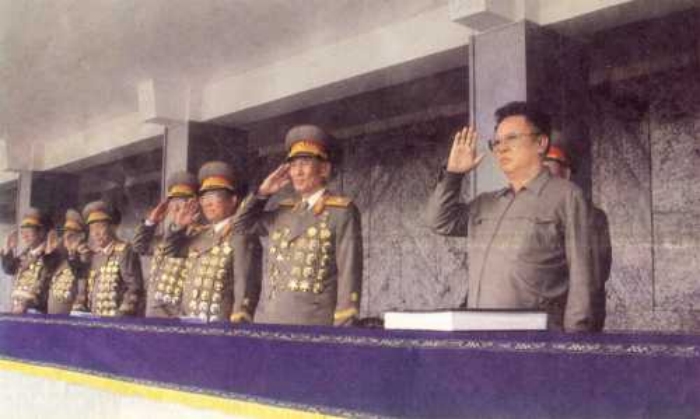
The
Pyongyang Times
Saturday, April 27, Juche 91 (2002)
Kim Jong Il sees 'Arirang' extravaganza
Kim Jong Il, general secretary of the Workers Party of Korea, chairman of the National Defence Commission of the DPRK and supreme commander of the Korean People's Army, saw the mass gymnastics and artistic performance "Arirang" on the evening of April 26 at the May Day Stadium.
Amidst the playing of music, the Korean leader appeared on the tribune of honour. The moment thunderous cheers burst forth and a display of fireworks decorated the sky above Pyongyang.
Flashcards created the letters "Highest glory to the great leader Comrade Kim Jong Il" and the stadium turned into a sea of flowers.
The 100,000-strong performance consisted of several sections, including "Arirang rainbow" and "Reunification Arirang".
The Korean people who were deprived of their country roamed about, singing "Arirang" of seperation and tears. However, in the era of Juche, the glorious era of the Workers' Party, they are advancing vigorously toward the status of a powerful country, singing the songs "Arirang of a Powerful Nation", "Army-People Arirang" and "Reunification Arirang". These impressive scenes were presented through a highly-refined gymnastics and artistic performance.
Music, dance, gymnastics and acrobatics spiced with distinctive local flavour, the three-dimensional and ever-changing large flashcards creating huge and beautiful murals and lighting apparatuses – all these shrouded the spectators in mystery. The refined skills of the performers and the display of high ideological and artistic value drew great admiration of the spectators.
Kim Jong Il acknowledged the enthusiastic cheers of the performers and expressed high admiration for their successful performance.
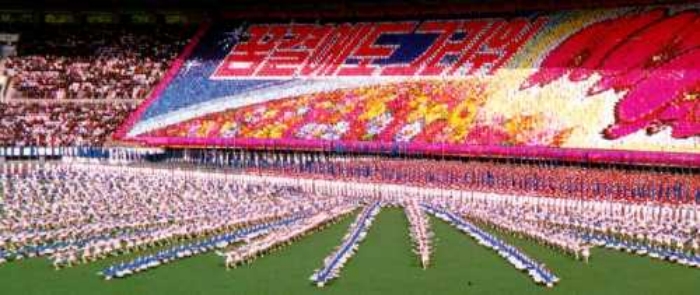
The
Pyongyang Times
Saturday, April 27, Juche 91 (2002)
By Kye In Jun PT
4th Kimilsungia Show closes
The 4th Kimilsungia Show, which opened on April 14 to mark the 90th anniversary of the birth of President Kim Il Sung, closed on April 19.
The Kimilsungia and Kimjongilia Exhibition House, where over 5,000 flowers of Kimilsungia were on display, was visited by many people every day.
A closing ceremony was held at the Kimilsungia and Kimjongilia Exhibition House.
Senior Party and state officials attended the ceremony, including Premier Hong Song Nam, other officials, people of the units that presented Kimilsungia at the exhibition, and KPA servicemen.
The results of the judges' assessment of the flowers were published at the ceremony.
The ministry of the People's Armed Forces, the Academy of Sciences, the General Committee of the Kim Il Sung Socialist Youth League, North Hwanghae Province, South Phyongan Province and Pyongyamg Municipality were among those awarded the top prize. Fifteen units received the second prize; 6 units the merit prize; and over 30 individuals, including working people, KPA servicemen and students who took part in the exhibition, were awarded prizes in recognition of their particular contribution.
Special prizes went to the Indonesian embassy in Pyongyang and Dongyuan Trading Corporation of Dandong, China.
Jang Chol, chairman of the Korean Kimjongilia Federation, in his closing address, pointed out that more than 400,000 Koreans, overseas Koreans, delegations from various countries and participants in the 20th April Spring Friendship Art Festival visited the exhibition house.
He noted that the exhibition shows the Korean people's will to perpetuate the memory of President Kim Il Sung and hold him as the eternal President.
Meanwhile, a workshop on the cultivation of Kimilsungia took place on April 17.
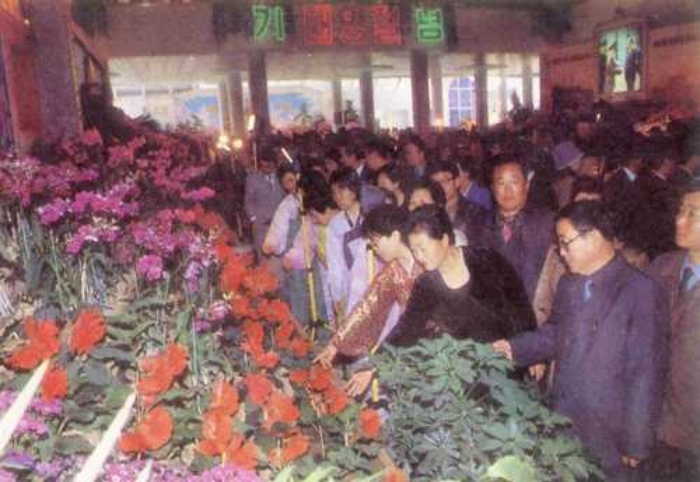
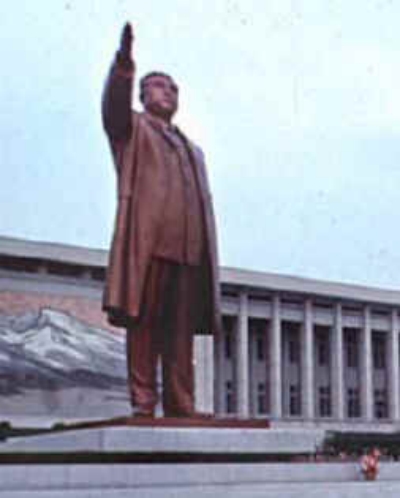
"Every
success, every achievement, every victory,
every scientific discovery, all knowledge, all wisdom,
all happiness, all virtue, are held to issue directly
from his leadership and inspiration."
